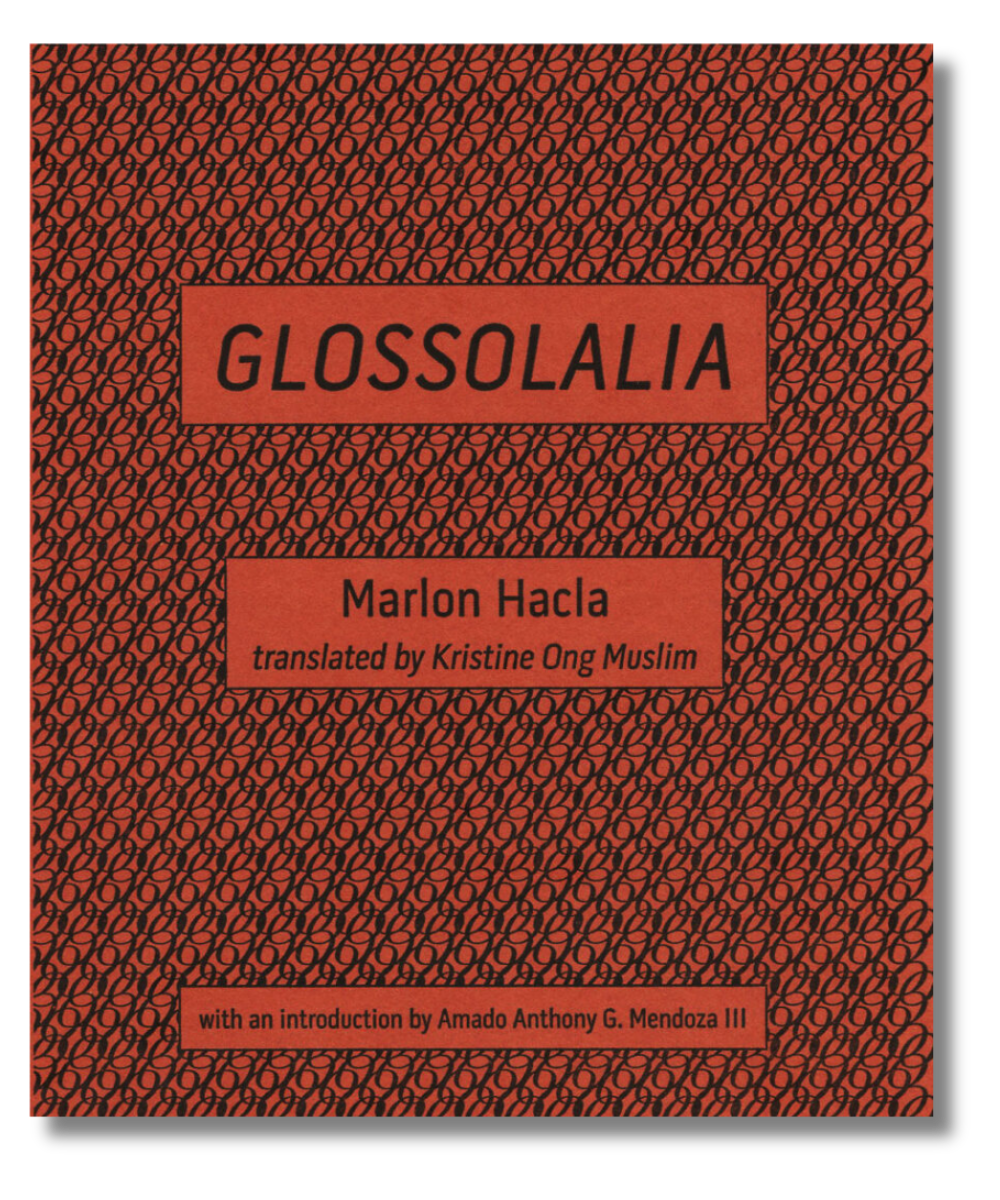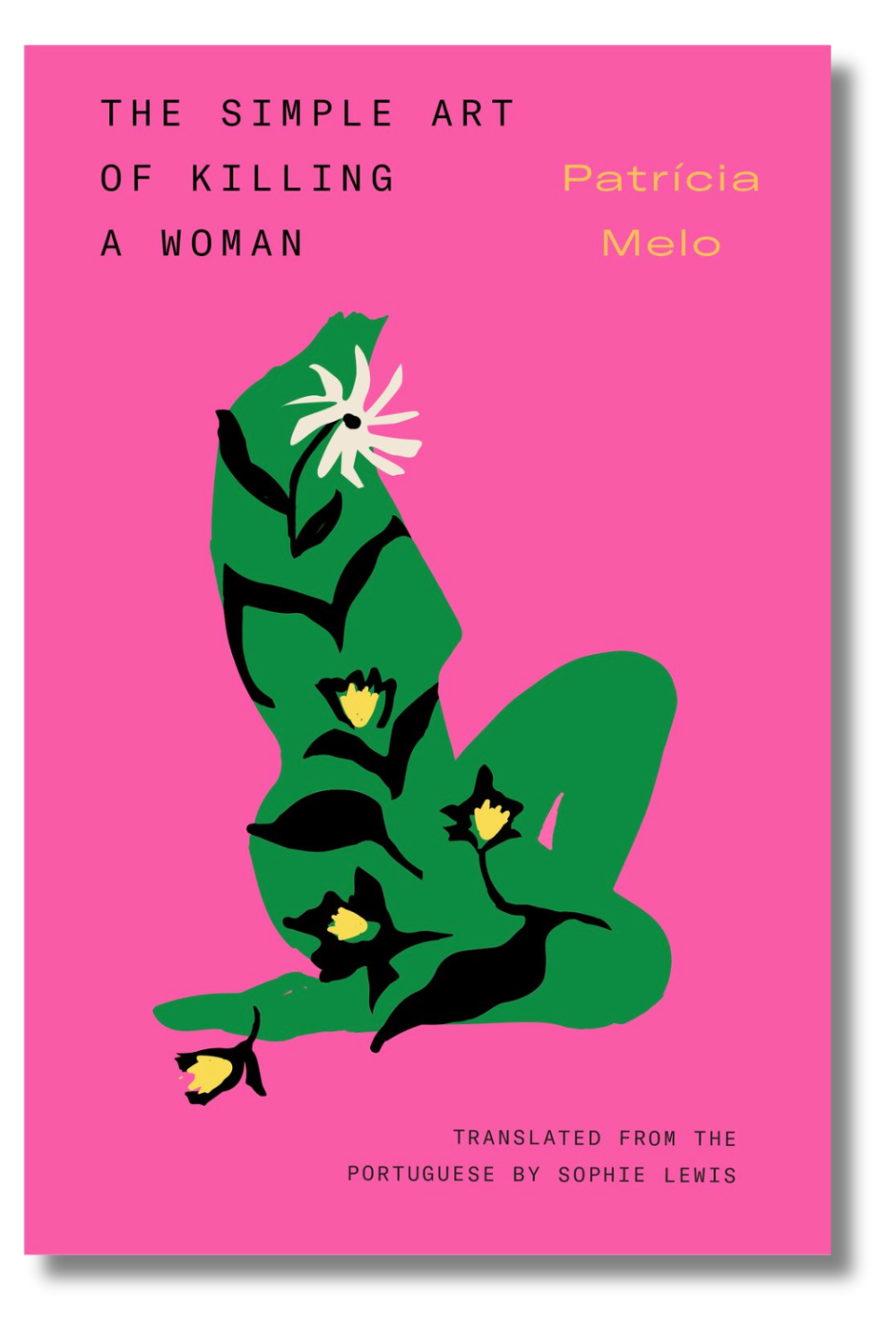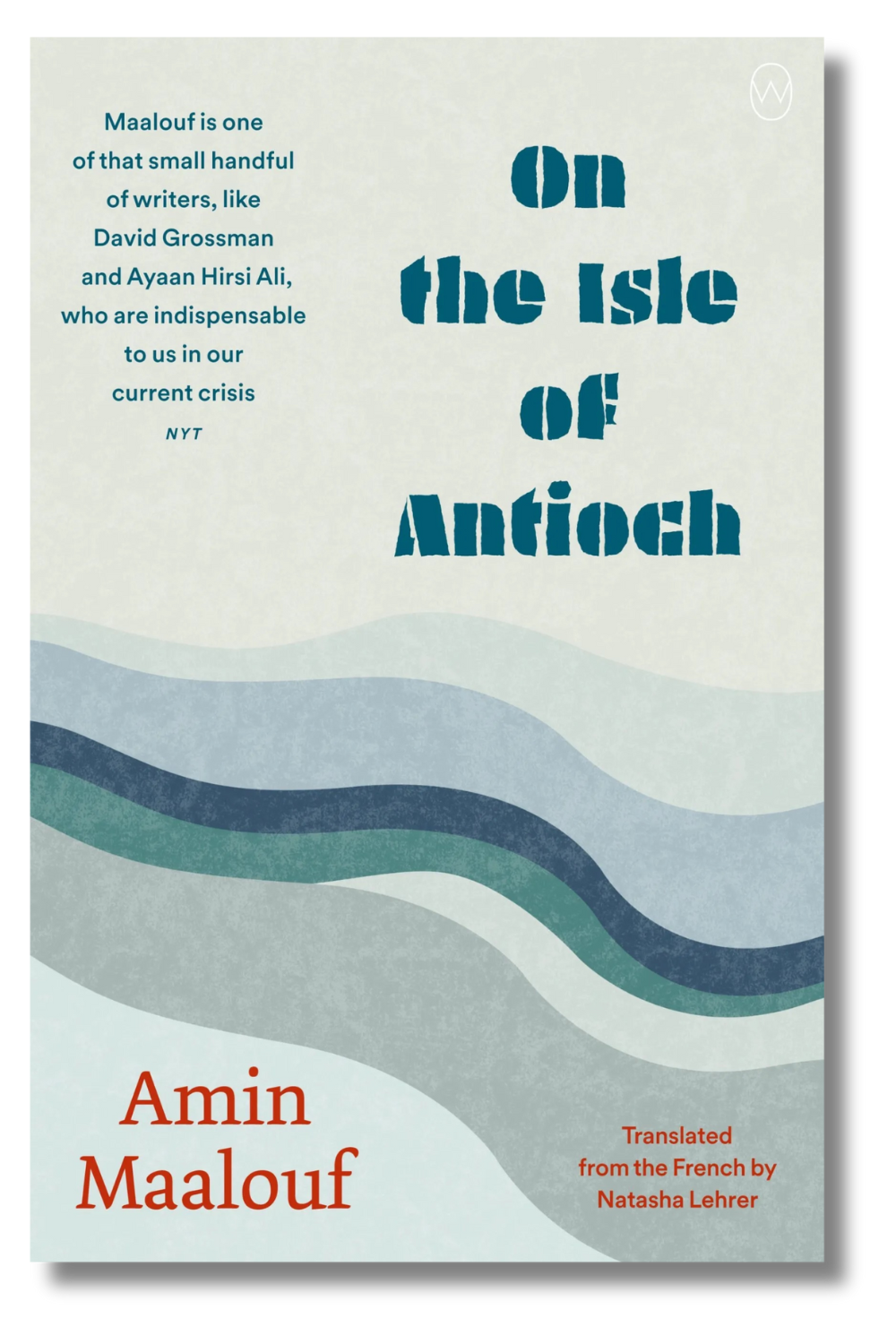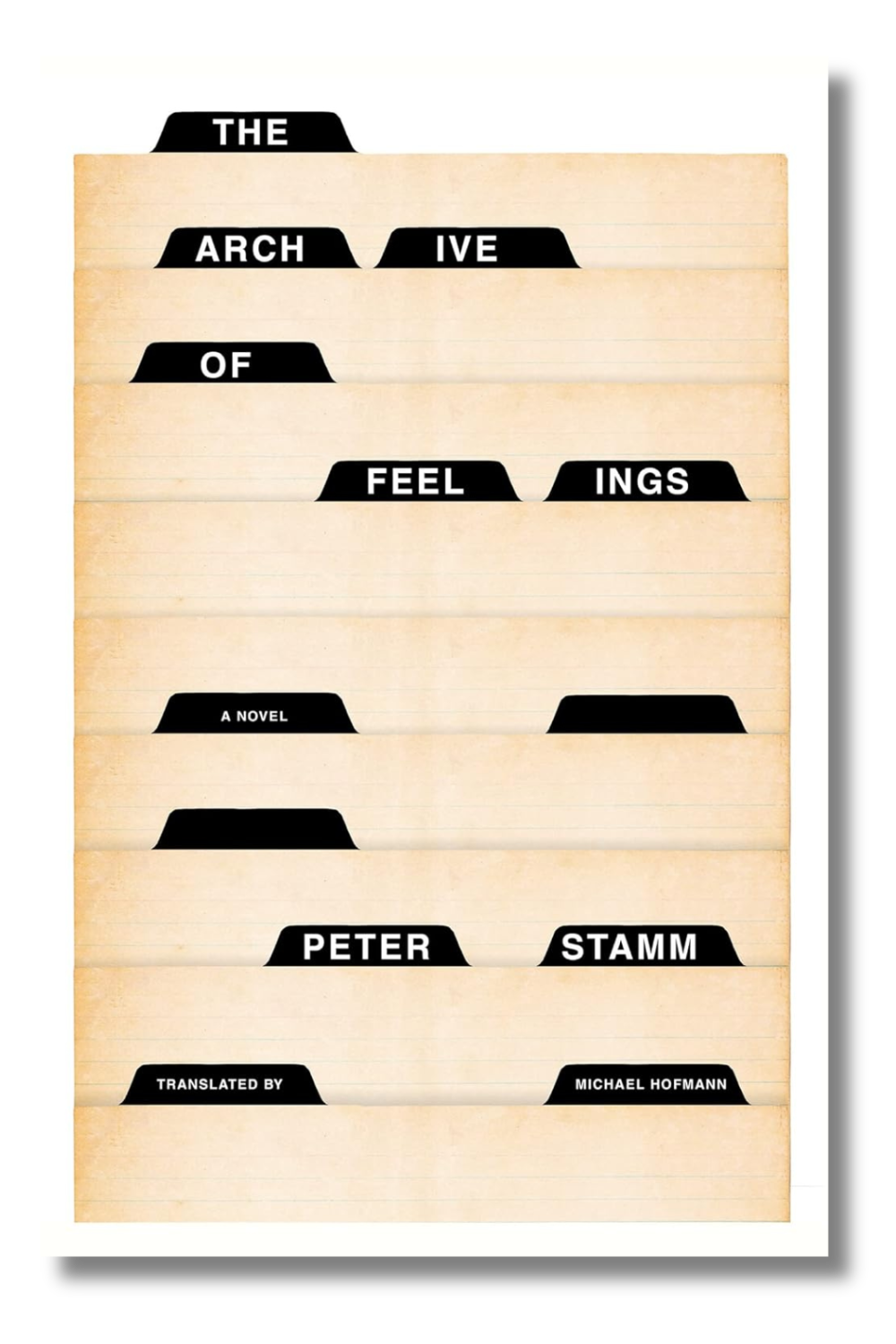From Ugly Duckling Presse | Glossolalia by Marlon Hacla, translated from the Filipino by Kristine Ong Muslim | Poetry | 200 pages | ISBN 9781946604019 | US$20.00
What the publisher says: “Feverish from the engrossing revelatory arcs of the uncanny, Glossolalia is a mind-bending foray into the twisted underlying logic of material reality and a rip-roaring romp through Philippine urban legends, psychogeography, and the uncomfortable, often seedy aspects of music, cinema, and art.”
What Sakinah Hofler at The Cincinnati Review says: “Translations can transcend the language of origin and transport us to universal places. Through the use of both warm and cold imagery as well as the exploration of nature, Marlon Hacla’s work, originally published in Filipino, builds and collapses two beings (human and beast) and two states of being (alive and dead) to explore what it means to actually live.”
What I say: Marlon Hacla’s Glossolalia contains multitudes, encompassing quiet moments of intimacy and sudden scenes of violence alike. Readers will also note a complex relationship to religion within some of these poems. (From “Howl”: “It was Tuesday when we knelt against a piece of paper that was god. It was Thursday when the piece of paper that was god was used up.”) The introduction to this edition by Amado Anthony G. Mendoza III is informative, and seeing the original poems beside their translations also makes the impact of Kristine Ong Muslim’s work tangible.
From Restless Books | The Simple Art of Killing a Woman by Patrícia Melo, translated from the Portuguese by Sophie Lewis | Fiction | 272 pages | ISBN 9781632063465 | US$17.00
What the publisher says: “From best-selling Brazilian crime novelist Patrícia Melo comes a genre-defying tale of women in the Amazon and their reckoning with brutal oppression—by turns poetic, humorous, dark, and inspiring.”
What Kirkus Reviews says: “Brazilian author Melo weaves together crime, magical realism, mythology, and social criticism in this relevant and urgent translation from the Portuguese by Lewis. Though the subject is horrifying, especially in the details about marred and dismembered victims, the narrator’s voice is captivating and compelling, offering strength and purpose rather than despair.”
What I say: The attorney protagonist of Patrícia Melo’s novel is haunted by her own family history and the legal case she ventures far from home to observe: “Maybe having a mother who’d been murdered was my secret identity. It was the black hole of my life.” The murder trial she travels to witness turns out to have wider effects, both thematically and in the local community. And her discovery that her seemingly mild-mannered boyfriend has a penchant for abuse heightens the tension even further.
From Roof Books | The Politics of Hope by Dubravka Djurić, translated from the Serbian by Biljana D. Obradović (additional translation by the author, Charles Bernstein, and James Sherry) | Poetry | 248 pages | ISBN 9780937804940 | US$25.00
What the publisher says: “Djurić formulates the politics of identity through nation-state, language, and poetic form, showing readers how these issues have changed since the ’90s civil war in the former Yugoslavia.”
What I say: The career-spanning collection The Politics of Hope can be an overwhelming read at times, with an abundance of textual experimentation, some of which ventures into the typographic. These lines, from the poem “Rules,” seem apropos: “Avoid the given inspiration / It’s unnecessary for a poem to appear.” A series of prose poems were the highlight, for me. And when Djurić writes, “I dream so as to create poems from them,” you believe her.
From World Editions | On the Isle of Antioch by Amin Maalouf, translated from the French by Natasha Lehrer | Fiction | 288 pages | ISBN 9781642861341 | US$18.99
What the publisher says: “Alec, a press artist with an impressive track record, settles on a remote island in the Atlantic Ocean. He has little contact with his neighbor, a solitary woman who wrote a cult book years ago, before withdrawing from public life. That is, until a gigantic power failure cuts them off from the rest of the world, and all of a sudden they find themselves dependent on each other.”
What Kirkus Reviews says: “Maalouf’s near-future yarn is reminiscent of Arturo Pérez-Reverte in its matter-of-fact presentation of the improbable, but the overarching warning is quite of our world and time . . . A beguiling, lyrical work of speculative fiction by a writer of international importance.”
What I say: A reclusive cartoonist living on a remote island at a time of global crisis develops a series of insights into the true nature of the events affecting the world. While the novel initially seems like it will focus on the protagonist’s relationship with an equally reclusive novelist, that thread becomes overshadowed by a plotline involving a secret society wrestling with an ethical dilemma of its own. (If you’ve ever wondered why one of the super-geniuses in the Marvel Universe hasn’t solved all of society’s problems, you’ll have a sense of the issues at stake here.) The blend of melancholic psychology, pulp thrills, and satire of American politics makes for an odd combination, and yet this novel is eminently readable.
From the Song Cave | Lunar Solo: Selected Poems by Jules Laforgue, translated from the French by Mark Ford | Poetry | 172 pages | ISBN 9798987828823 | US$18.95
What the publisher says: “Generally acknowledged as the inventor of vers libre or free verse, Laforgue has proved enormously influential on many writers, in particular on the modernist poets T. S. Eliot and Ezra Pound.”
What The New Black Bart Poetry Society says: “The tone of Laforgue’s poetry can be wry, ironic, wistful, feverish, all in the same poem, quite modern, in fact, and with the exception of a few anachronisms, would be at home in the contemporary milieu.”
What I say: Apparently, T. S. Eliot described Jules Laforgue as the poet “to whom I owe more than to any one poet in any language.” The vivid works contained in this collection offer a good overview of the evocative imagery and moody ruminations at play in his work. Consider these lines, from “Lament of the Dreary Autumn”: “Autumn, autumn – saying goodbye / To ‘ goodbye’ itself.” This is ideal reading for the colder months.
From Other Press | The Archive of Feelings by Peter Stamm, translated from the German by Michael Hofmann | Fiction | 192 pages | ISBN 9781635422757 | US$15.99
What the publisher says: “Forty years ago—almost a lifetime—he confessed his love to a classmate and close friend, Franziska. Now, living in his late mother’s house with the obsolete archive of the newspaper he once worked for, he looks back on days spent poring over files and clippings, increasingly withdrawn from the world.”
What Publishers Weekly says: “Despite a slow start, the looming promise of these old friends being reunited energizes the action, and Stamm delivers a striking and earnest conclusion. Fans of the author will love this efficient and wistful work.”
What I say: The narrator of The Archive of Feelings is a man in his fifties haunted by his past, including his close relationship with a woman who went on to become a beloved musician. Certain passages from this book are enormously affecting: “Suddenly my whole life looks pretty wretched to me, it’s as though I hadn’t ever really been alive, just watched others in their lives, and waited for something to happen. And nothing happened.” The way Stamm evokes the protagonist’s quirks and foibles, and the surreal tangents the narrator’s thoughts lead him down, take this book to unexpected places.
Looking for more reading suggestions? Check out Tobias Carroll’s recommendations from last month.
Disclosure: Words Without Borders is an affiliate of Bookshop.org and will earn a commission if you use the links above to make a purchase.
Copyright © 2023 by Tobias Carroll. All rights reserved.

















